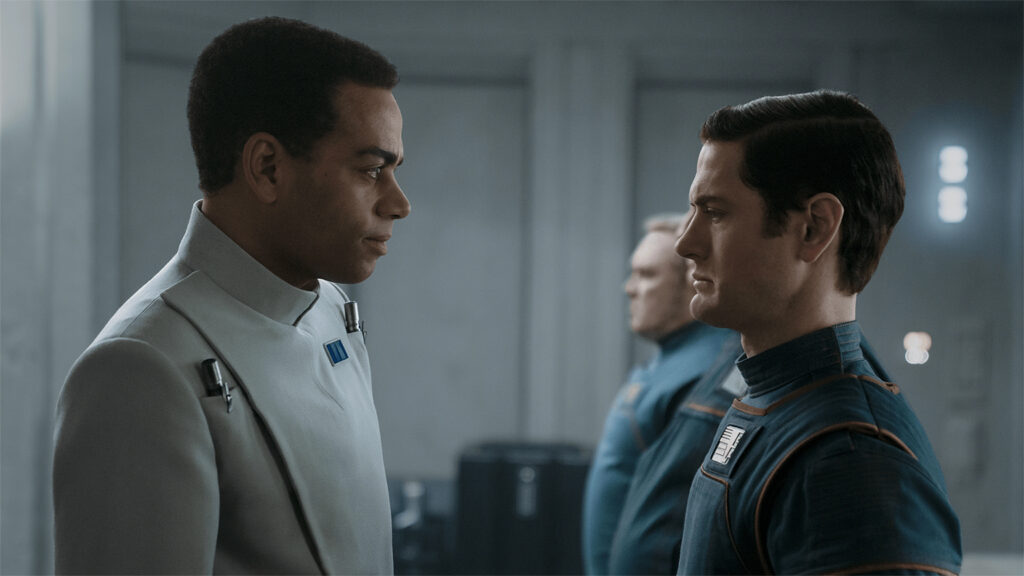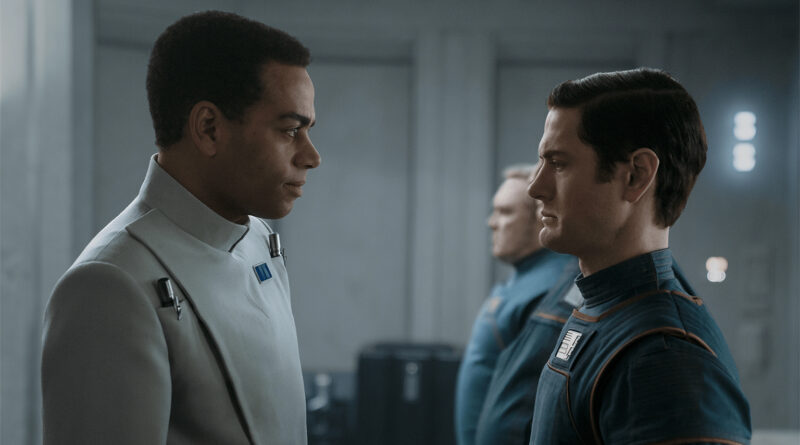Andor: Fascism and Star Wars
The newest Star Wars live-action Disney+ series, Andor, received an unusually long promotional period before its premiere. As Tricia Barr remarked during Fangirls Going Rogue’s coverage, one conspicuous feature of the promotional discussion of the series was creator and showrunner Tony Gilroy’s consistent and repeated emphasis of the word “fascism” to describe one of Andor’s themes. Star Wars storytelling always has taken inspiration from the real world; along with the Vietnam War, George Lucas intentionally drew upon World War II when creating the Original Trilogy. After four episodes, it is easy to see how fascism past and present was on Gilroy’s mind. Fascism as a theme of Andor also suggests a frame for anticipating the remaining eight episodes of the first season, as well as the twelve episodes of the second season, which are due to begin filming in November.
Militarism is a common trait of fascist regimes. In Star Wars, the militarism of the Empire is well established. Lucas took the name “stormtroopers” from Nazi Germany. The Prequel Trilogy and The Clone Wars animated series demonstrate how Darth Sidious instigated the Republic-Separatist conflict to justify the massive military buildup that would be necessary to seize control of the galaxy upon his declaration of the Empire. Other animated series, particularly The Bad Batch and Star Wars Rebels, further elaborate on the necessity of militarism to the Empire’s regime of control. And the Death Star, of course, is the ultimate weapon for imposing rule by fear over the planets of the galaxy. In the first four episodes of Andor, the militarism of the Empire is less prominent. As the story delves further into Mon Mothma’s political challenges in the Imperial Senate, Saw Gerrera’s overt desire for “war” against the Empire, and Cassian’s burgeoning allegiance to the Rebellion, however, it is likely Imperial military ambitions will take on greater visibility in the story.
Corporatism is another prominent feature of fascist rule. In capitalism, the economy is based upon private property, competitive markets, and the profit motive, each subject to some degree of government restriction (which varies from the minimal regulations of libertarianism to the more rigorous oversight in social democracy). In a command economy, especially when combined with variations of socialism or communism, none of those three features may be present. Under fascism, the economy, like all other facets of society, must serve the national interest as defined by the fascist regime. Some sectors of the economy might be nationalized into public ownership and central planning, while other sectors continue with private ownership and market competition. Star Wars has included corporatist elements previously, such as the Mining Guild and Bounty Hunter Guild as well as the Empire’s conscription of major private-sector corporations to serve the Imperial war machine.

The first four episodes of Andor portray fascist corporatism in implementation. Even fifteen years into the Emperor’s rule, it would not be efficient or affordable to rely upon Imperial governors and Imperial garrisons to maintain control of every planet in the galaxy. An entity like the Preox-Morlana Corporate Zone makes perfect sense, as long as it remains subservient. The Pre-Mor Authority can run its business as it sees fit, including oppressing its workers and the other residents of their affiliated planets, and the Empire has outsourced the social control it needs to maintain political power. Chief Inspector Hyne, who leads the Security Inspection Team at Corporate Security Headquarters, must travel to attend an “Imperial regional command review” that includes reporting on crime rates within Pre-Mor’s territory. Sergeant Linus Mosk expresses the fascist synergy plainly: “Corporate Tactical Forces are the Empire’s first line of defense.” After Deputy Inspector Syril Karn disobeys Hyne’s instructions, resulting in the disastrous failed operation on Ferrix, the true balance of power under fascism comes to the fore. Lieutenant Supervisor Blevin of the Imperial Security Bureau arrives at Morlana One and informs Hyne, Karn, and Mosk that Pre-Mor’s corporate independence has been terminated, with permanent Imperial authority instituted in its place. Hyne had understood the truth all along: acting in the corporation’s best interest meant staying below the attention of the Empire, even at the price of holding no one accountable for the ignominious deaths of two sentry guard employees.
In his 2018 book How Fascism Works: The Politics of Us and Them, Yale philosopher Jason Stanley describes a number of other prominent features of twentieth-century and contemporary fascism. Some of them, such as a veneration of a mythic past, are less salient to the Empire in Star Wars. Reliance upon propaganda to create an unreality imposed by the regime upon its subjects appears intermittently in Star Wars, most notably in the way the Empire managed, in the span of a generation, to slander the Jedi as villains rather than heroes and in large part erase them from public memory. The rhetoric of “law and order” typically is associated more with issues of street crime and local community safety rather than large-scale rebellion, though aspects of the oppression of Lothal in the early seasons of Star Wars Rebels have similarities to the mindset and tactics of the Pre-Mor strike team on Ferrix in Andor.
One dynamic emphasized by Stanley is the importance of hierarchy in fascist ideology. In the real world, fascism has frequently relied upon racial or ethnic hierarchy to justify oppression, even genocide, as well as gender hierarchy, particularly the subservience of women to a maternal role in bearing and raising the children of the fascist state. Fascist movements in the United States similarly have shared an ideology of patriarchal white supremacy.
The Star Wars franchise has varied over time in its association of the Empire with identity-based hierarchy. In some materials, the Empire is portrayed as overtly and deliberately human-centric, at times white-male-centric, in its power structure. Other materials portray the Empire as totalitarian and tyrannical without ascribing a discriminatory motive, instead relying on general concepts of loyalty and obedience. In the second episode of Andor, Sergeant Mosk snidely reminds his strike team that the residents of Ferrix may attend a monthly “territorial forum” to lodge “official complaints” about Pre-Mor’s operations and governance. While this idea resonates with fascism, imperialism, and colonialism, it is unclear whether Mosk is expressing a hierarchy of identity (his team includes men of color but not women or aliens) or simply dominance through power. The ISB staff meeting in the fourth episode of Andor is attended exclusively by humans, though women and people of color are included. Lieutenant Gorn, the Imperial turncoat on Aldhani, is a man of color; it remains to be seen whether his decision to aid Vel’s mission to steal from the Empire is motivated by moral conscience alone, a reaction to racial hierarchy, or a combination of factors. ISB Supervisor Dedra Meero is ambitious and resentful of those impeding her rise, and it likewise remains to be seen the extent to which her obstacles are a product of gender discrimination rather than entrenched bureaucracy, her relative youth, or other factors. (Denise Gough, who portrays Dedra, has alluded to the notion that her story confronts patriarchal norms in the ISB.) When Syril Karn returns to his mother’s abode after ISB’s takeover of Pre-Mor, we see that Andor may be tackling a hierarchy of social class within the Empire, as well, as part of the explanation for Syril’s motivations and aspirations. With many episodes remaining, it will be interesting to observe which forms of hierarchy take the emphasis in Andor. It already seems clear, however, that Tony Gilroy’s emphasis on fascism as a theme of the series is presented in many forms, including notions of hierarchy.
Related Links
- Fangirls Going Rogue Episode 22.14: Let’s Get Ready for Andor
- Andor’s Diego Luna and Genevieve O’Reilly On Fangirls Going Rogue
- Fangirls Going Rogue Episode 22.16: Andor’s Adria Arjona Roundtable
- Andor: Striving To Get Back To Star Wars’ Political Roots
- REVIEW: Andor
- Hyperspace Theories: Andor Begins











